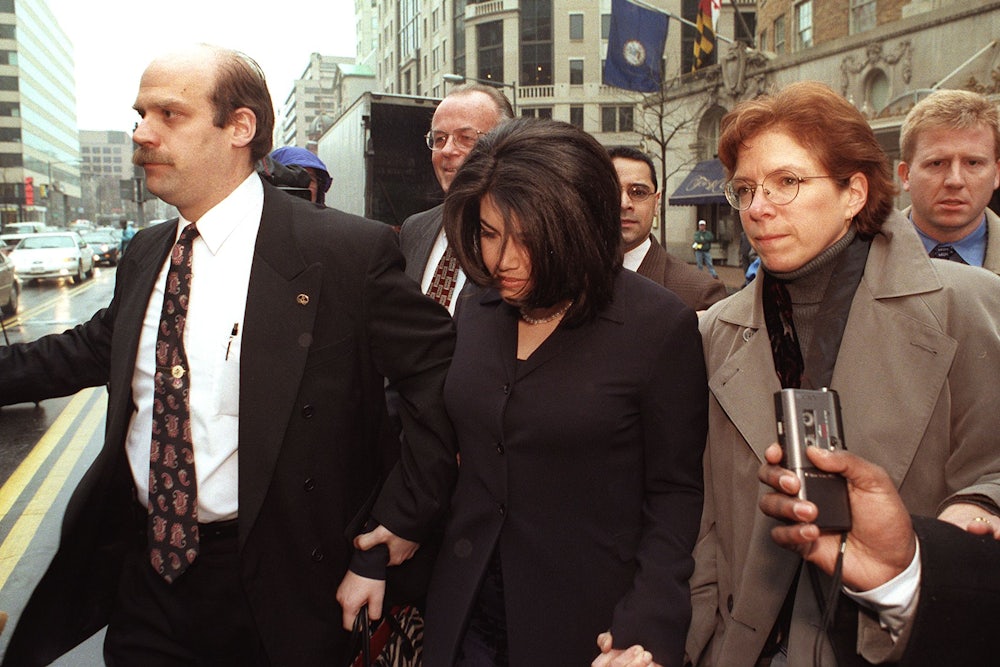The year may be 2016, but we’re still trying trying to grapple with the sexism of two decades ago. Anita Hill, Marcia Clark, and Monica Lewinksy were all subjected to horrifyingly misogynist attacks in the 1990s, and by a quirk of the zeitgeist, all are in the news again. The fact that our culture is still coming to terms with this unfinished business is surely tied to the fact that Hillary Clinton is on track to become the first female presidential nominee of a major political party. Since Clinton is herself no stranger to woman-bashing barrages, she might welcome attempts to rectify the sexism of the 1990s as part of a larger feminist wave. But the Lewinsky episode, in particular, is also fraught with peril for Clinton’s presidential prospects.
What Clark, Hill, Lewinsky, and Clinton have in common is that they were all strong public women who were pilloried for defying gender expectations. As we’re reminded by the new FX series The People v. O.J. Simpson, Marcia Clark was repeatedly slimed in the press when she came to prominence as a prosecutor in the O.J. Simpson trial. National Enquirer printed nude photos provided by Clark’s former mother-in-law, while more reputable media questioned both her appearance (something that’s all too familiar to Clinton) and her fitness as a mother.
“I really didn’t want the spotlight, but there was no way to escape it,” Clark recently told People magazine. “And there was real hostility there. People would try to give me advice like, ‘You shouldn’t come across tough. Wear pastels. Talk softer.’” The thrust of this advice makes clear that it was Clark’s challenge to traditional ideas about femininity that made her threatening.
In 1991, Anita Hill almost derailed the nomination of Clarence Thomas to the Supreme Court, a story told in the new HBO film Confirmation. David Brock, then a right-wing journalist, notoriously described Hill as “a little bit nutty and a little bit slutty.” Brock, who now ironically plays a major part in the Hillary Clinton circle as a surrogate and informal advisor, has since apologized for his remarks. But it wasn’t just conservative Republicans who went after Hill. Joe Biden, then a senator, dismissed Hill by bringing up a line from William Congreve: “Hell hath no fury like a women scorned.”
The role Biden played in the besmirching of Hill is ample proof that when it comes to 1990s sexism, Democrats have their share of skeletons in the closet. This is even more true of the Monica Lewinsky case. After all, in their zeal to protect Bill Clinton in the 1990s, some Democrats cast Lewinsky as an unstable stalker who thrust herself on the president.
Drawing on the wretched treatment that she received during the sex scandal that led to Bill Clinton being impeached, Lewinsky has emerged as a forceful critic of slut-shaming and online bullying. In an interview over the weekend with The Guardian, Lewinsky indicated that she includes Bill Clinton’s account of her as “that woman” as part of the abuse she received. “I was branded as a tramp, tart, slut, whore, bimbo, and, of course, ‘that woman’,” Lewinsky said. “It was easy to forget that ‘that woman’ was dimensional, had a soul.”
No less than Clark, Hill, and Lewinksy, Hillary Clinton suffered from an endless sexist onslaught. Writing in the New Republic, Camille Paglia labeled Clinton a “man-woman and bitch goddess.” In 1992, When Clinton defended her decision to have a career rather than bake cookies, she was accused of insulting American housewives. To earn the forgiveness of the press, she engaged in a “bake off” with Barbara Bush. That same year, the American Spectator described Clinton as the “Lady MacBeth of Arkansas.”
For Clinton, the reopening of the old 1990s wounds is a heartening development in one respect: The fact that there’s a willingness to look back and grapple with the mistreatment of prominent women suggests a cultural shift that could help elect the first woman president. But revisiting the Hill and Lewinsky controversies means that some of her closest allies—notably Vice President Biden and Bill Clinton—also need to make amends.
Of course, Hillary Clinton can’t be held responsible for what her allies or her husband do. Still, the ability of Democrats to act as effective advocates for feminism is hampered by the fact that the sexist mistreatment of Hill and Lewinsky hasn’t received a full reckoning. This cultural moment offers a golden opportunity for that. David Brock apologized to Anita Hill; Joe Biden needs to do the same. And somehow, Bill Clinton needs to try to square himself with Monica Lewinsky by formally acknowledging that the attacks on her reputation were unjust. Revisiting the Lewinsky scandal in a forthright manner might be painful, but it would also open up a conversation that would serve Hillary Clinton well.
